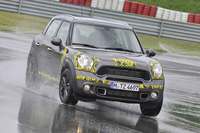BMW Plans Mini Production in The Netherlands
By Henny Hemmes
Senior European Editor
The Auto Channel
AMSTERDAM, July 23, 2012. BMW AG has confirmed to consider Mini production in the NedCar plant in Born, The Netherlands.
Mitsubishi Motor Corp, the current owner of NedCar, announced in December 2010 that it would cease production of the Colt and Outlander there and last February confirmed not to plan to build any new models in the Dutch plant. Earlier this month, BMW made the official announcement after lots of speculations and rumors were circulating about possible interest from other manufacturer, which would save the jobs of some 1,500 people and indirectly many more in the area of the Zuid-Limburg province, which is struggling with higher unemployment than the national average.
The Dutch VDL Group, a Dutch international industrial company focused on development, production and sales of finished or semi-finished products, buses and coaches, has serious plans to take over NedCar. Under this construction, BMW is prepared to consider using production capacity of VDL to build Mini’s. VLD is free to also acquire other customers. Internal sources mention a year production of between 60 and 90 thousand cars.
NedCar would need two years to retool for production of new models. Its 1,500 employees will be laid off, but in the meantime the unions and VDL agreed that they will be paid until the plant reopens in the end of 2014. They will also get the guarantee to be able to rejoin VDL when it starts its operations.
Harald Krüger, board member of BMW AG said: “Over the past eleven years, Mini has been a global success and the BMW Group has even greater plans for the further development of the brand.”
Last month, BMW announced it will invest 750 million euro to crank up Mini production, while now they said another 300 million euro will be invested in its British plants in Oxford and Swindon. This is essential for the international growth of the Mini brand, but since the plants are reaching their maximum capacity, the company is planning to add ‘satellite production’ outside Great-Britain, and, according to Krüger “as close as possible to our UK operations.” Mini is planning to increase its model line within the next 5 years to 10 vehicles, including the Countryman coupe and a small minivan, possibly dubbed Traveller. It is well-known that Mini wants to sell half a million cars per year in the next couple of years with 10 model lines.. In 2011 Mini sold a record of 285,000 vehcles,1 22 per cent rise on the previous year. The British Oxford plant has a yearly capacity of 260,000 vehicles, while contract manufacturer Magna Steyr can build some 100,000 units of the Mini Countryman.
The Dutch plant was founded in 1967 by DAF, which was too small to develop new models on its own and partnered Volvo Cars in 1972. For continued profitability Volvo had to crank up production to 120,000 units per year and formed a joint venture with Mitsubishi in 1991 under the name of NedCar. Together with the Dutch state each partner had a 33.3 percent stake Eight years later, the Dutch government sold its shares to Mitsubishi and Volvo. From 2004, DaimlerChrysler produced its Smart ForFour next to the Mitsubishi Colt. NedCar is currently owned by Mitsubishi, who announced in December 2010 to stop building its Colt and Outlander models in The Netherlands. In February 2012, the MMC announced that NedCar was not going to build new models at all and would stop production at the end of 2012. Earlier this years, there has been interest in the NedCar plant from Swiss Q-PM for production of rotary engines and from Nissan for production of parts.
The VDL Group intends to take over NedCar, provided they have a signed contract from BMW. The Group was founded in 1953 and has to date 81 operating companies in 18 countries with some 7,400 employees.



